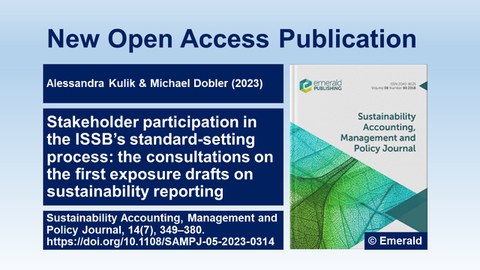13.12.2023
Stakeholder-Beteiligung im Standardsetzungsprozess des ISSB zur Nachhaltigkeitsberichterstattung: Empirische Befunde in SAMPJ veröffentlicht
Alessandra Kulik und Michael Dobler (Professur für BWL, insb. Wirtschaftsprüfung und Steuerlehre der Technischen Universität Dresden) haben das Teilnahmeverhalten von Stakeholdern in den Konsultationen zu ED IFRS S1 und ED IFRS S2 des International Sustainability Standards Board (ISSB) anhand von Stellungnahmen empirisch untersucht. Ihre Befunde sind nun als Open Access-Publikation im Sustainability Accounting, Management and Policy Journal (SAMPJ) veröffentlicht. Die empirischen Befunde verdeutlichen Ungleichgewichte in der Repräsentation von Stakeholdern, welche sich nicht mit den gängigen Ungleichgewichten beim „Schwester-Board“ International Accounting Standards Board (IASB) decken. Die Ergebnisse bergen erheblichen Neuigkeitsgehalt und kritische Implikationen für einen bedeutsamen Aspekt der Input-Legitimation des Standardsetzungsprozesses des ISSB als neuem internationalem Standardsetzer im Bereich der Nachhaltigkeitsberichterstattung.
Kulik, Alessandra & Dobler, Michael (2023). Stakeholder participation in the ISSB’s standard-setting process: the consultations on the first exposure drafts on sustainability reporting. Sustainability Accounting, Management and Policy Journal, 14(7), 349–380. https://doi.org/10.1108/SAMPJ-05-2023-0314
Abstract
- Purpose – This paper aims to provide empirical evidence on formal stakeholder participation (or “lobbying”) in the early phase of the International Sustainability Standards Board’s (ISSB’s) standard-setting.
- Design/methodology/approach – Drawing on a rational-choice framework, this paper conducts a content analysis of comment letters (CLs) submitted to the ISSB in response to its first two exposure drafts (published in 2022) to investigate stakeholder participation across different groups and jurisdictional origins. The analyses examine participation in terms of frequency (measured using the number of participating stakeholders) and intensity (measured using the length of CLs).
- Findings – Preparers and users of sustainability reports emerge as the largest participating stakeholder groups, while the accounting/sustainability profession participates with high average intensity. Surprisingly, preparers do not outweigh users in terms of participation frequency and intensity; and large preparers outweigh smaller ones in terms of participation intensity but not participation frequency. Internationally, stakeholders from countries with a private financial accounting standard-setting system participate more frequently and intensively than others. In addition, country-level economic wealth and sustainability performance are positively associated with more participating stakeholders.
- Practical implications – This study is of interest for organizations and stakeholders involved in or affected by standard-setting in the field of sustainability reporting. The finding of limited participation by investors and from developing countries suggests the ISSB take actions to enhance the voice of those stakeholders.
- Social implications – The imbalances in stakeholder participation that were found pose potential threats to an important aspect of the input legitimacy of the ISSB’s standard-setting process.
- Originality/value – To the best of the authors’ knowledge, this paper is the first to explore stakeholder participation by means of CLs with the ISSB in terms of frequency and intensity.

